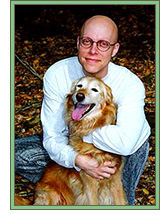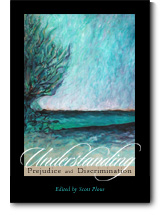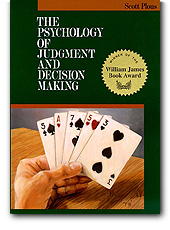 |


 Scott Plous holds a Ph.D. in psychology from Stanford University. He joined the Wesleyan University faculty in 1990 and has interests in judgment and decision making; international security; prejudice and discrimination; the human use of animals and the environment; interactive web-based research; and action teaching. Scott Plous holds a Ph.D. in psychology from Stanford University. He joined the Wesleyan University faculty in 1990 and has interests in judgment and decision making; international security; prejudice and discrimination; the human use of animals and the environment; interactive web-based research; and action teaching.
Among social psychologists, Professor Plous is perhaps best known as the founder and Executive Director of Social Psychology Network, a suite of nonprofit web sites supported by the National Science Foundation, several other organizations, and more than 500 members. Collectively, these sites have received more than 393 million page views.
Professor Plous is a Fellow of the Association for Psychological Science, the American Psychological Association, the American Association for the Advancement of Science, the Society for the Teaching of Psychology, the Society of Experimental Social Psychology, the Society for Global Psychology, and APA Division 15 (Educational Psychology). He also serves on the Institute for Humane Education Advisory Council, and his work has been recognized with several national and regional awards, including an SSRC-MacArthur Foundation Fellowship in International Peace and Security, and those listed below:
CAREER HONORS AND AWARDS
RESEARCH AND WRITING
TEACHING AND MENTORING
PROFESSIONAL SERVICE
Personal Information: Professor Plous lives in West Hartford, Connecticut. His personal interests include hiking, international travel, photography, and web design. For a media photo, please click here.


Courses Taught
- Social Psychology (Wesleyan University)
- Social Psychology (massive open online course)
- The Psychology of Prejudice and Discrimination
- Research Methods in Social Psychology
- Psychological Statistics
- Computer Laboratory in Psychological Statistics
- Practicum in Social Psychology


Selected Publications
Takooshian, H., Gielen, U. P., Plous, S., Rich, G. J., & Velayo, R. S. (2016). Internationalizing undergraduate psychology education: Trends, techniques, and technologies. American Psychologist, 71, 136-147.
Plous, S. (2012). Action teaching. In D. Christie (Ed.)., The Encyclopedia of Peace Psychology (pp. 1-5). New York: Wiley-Blackwell.
Plous, S. (2009, Winter). Are you an action teacher? Win $1,000 while making the world a better place. Psychology Teacher Network, 18(4), pp. 1, 4, 8, 10, 11.
No authorship indicated. (2008). Charles L. Brewer Award for Distinguished Teaching of Psychology. American Psychologist, 63, 357-359.
Plous, S., & Zimbardo, P. G. (2004, September 10). How social science can reduce terrorism. Chronicle of Higher Education, pp. B9-B10. [Reprinted in The General Psychologist, 40(1), pp. 1-2 (Spring, 2005); Thio, A., & Calhoun, T. (Eds.). (2006). Readings in Deviant Behavior (4th ed.). Boston: Allyn & Bacon; and Crisis Times, April 2006, Volume 2, Issue 2, pp. 1-2.]
 Plous, S. (Ed.). (2003). Understanding prejudice and discrimination. New York: McGraw-Hill.
Plous, S. (Ed.). (2003). Understanding prejudice and discrimination. New York: McGraw-Hill.
Plous, S. (2003). Is there such a thing as prejudice toward animals? In S. Plous (Ed.), Understanding prejudice and discrimination (pp. 509-528). New York: McGraw-Hill.
Plous, S., & Herzog, H. (2001). Assessing the reviewers of animal research: Response. Science, 294, 1831-1832.
Plous, S., & Herzog, H. (2001). Reliability of protocol reviews for animal research. Science, 293, 608-609. [See also the press release]
Plous, S., & Herzog, H. A., Jr. (2000). Poll shows researchers favor lab animal protection. Science, 290, 711.
Plous, S. (2000). Responding to overt displays of prejudice: A role-playing exercise. Teaching of Psychology, 27, 198-200.
Plous, S. (2000). Tips on creating and maintaining an educational web site. Teaching of Psychology, 27, 63-70.
Plous, S., & Herzog, H. A., Jr. (1999, June). Should the AWA cover rats, mice, and birds? The results of an IACUC survey. Lab Animal, pp. 38-40.
Plous, S. (1998). Opinion research on animal experimentation: Areas of support and concern. Technical report in Dell, R. (Chair), Pain management and humane endpoints. Workshop sponsored by the National Academy of Sciences Institute for Laboratory Animal Research, Washington, DC.
Plous, S. (1998). Signs of change within the animal rights movement: Results from a follow-up survey of activists. Journal of Comparative Psychology, 112, 48-54.
Plous, S., & Neptune, D. (1997). Racial and gender biases in magazine advertising: A content-analytic study. Psychology of Women Quarterly, 21, 627-644. [Reprinted in: Pyrczak, F. (Ed.). (1998). Social science research: A cross section of journal articles for discussion and evaluation (2nd ed.). Los Angeles, CA: Pyrczak Publishing.]
Plous, S. (1997). Animal research in psychology. American Psychologist, 52, 1250-1252.
Plous, S. (1996). Attitudes toward the use of animals in psychological research and education: Results from a national survey of psychologists. American Psychologist, 51, 1167-1180.
Plous, S. (1996). Ten myths about affirmative action. Journal of Social Issues, 52, 25-31.
Plous, S. (1996). Attitudes toward the use of animals in psychological research and education: Results from a national survey of psychology majors. Psychological Science, 7, 352-358.
White, J. A., & Plous, S. (1995). Self-enhancement and social responsibility: On caring more, but doing less, than others. Journal of Applied Social Psychology, 25, 1297-1318.
Plous, S. (1995). A comparison of strategies for reducing interval overconfidence in group judgments. Journal of Applied Psychology, 80, 443-454.
Plous, S., & Williams, T. (1995). Racial stereotypes from the days of American slavery: A continuing legacy. Journal of Applied Social Psychology, 25, 795-817.
Plous, S., Chesne, R. B., & McDowell, A. V., III. (1995). Nutrition knowledge and attitudes of cardiac patients. Journal of the American Dietetic Association, 95, 442-446.
 Plous, S. (1993). The nuclear arms race: Prisoner's Dilemma or Perceptual Dilemma? Journal of Peace Research, 30, 163-179. Plous, S. (1993). The nuclear arms race: Prisoner's Dilemma or Perceptual Dilemma? Journal of Peace Research, 30, 163-179.
Plous, S. (1993). Psychological mechanisms in the human use of animals. Journal of Social Issues, 49, 11-52. [Updated 2003 version]
Plous, S. (1993). The psychology of judgment and decision making. New York: McGraw-Hill. [Hardbound edition concurrently published by Temple University Press.]
Plous, S. (1991). An attitude survey of animal rights activists. Psychological Science, 2, 194-196.
Plous, S. (1991). Biases in the assimilation of technological breakdowns: Do accidents make us safer? Journal of Applied Social Psychology, 21, 1058-1082.
Plous, S. (1989). Thinking the unthinkable: The effects of anchoring on likelihood estimates of nuclear war. Journal of Applied Social Psychology, 19, 67-91.
Plous, S. (1987). Perceptual illusions and military realities: Results from a computer generated Perceptual Dilemma. Journal of Conflict Resolution, 31, 5-33.
Plous, S. (1987, February 21). An alternative proposal: Ban missile flight testing. The Nation, pp. 219-220.
Plous, S., & Zimbardo, P. G. (1986). Attributional biases among clinicians: A comparison of psychoanalysts and behavior therapists. Journal of Consulting and Clinical Psychology, 54, 568-570.
Plous, S. (1986, January). No first use: Having it both ways. Bulletin of the Atomic Scientists, pp. 10-11.
Plous, S. (1985). Perceptual illusions and military realities: A social psychological analysis of the nuclear arms race. Journal of Conflict Resolution, 31, 5-33. [Reprinted in B. Russett, H. Starr, & R. J. Stoll (Eds.), Choices in world politics: Sovereignty and interdependence. New York: W. H. Freeman and Company.]
Plous, S., & Zimbardo, P. G. (1984, November). The looking glass war. Psychology Today, pp. 48-59. [Reprinted in G. Weaver (Ed.), Readings in cross-cultural communication (2nd ed.). Needham Heights, MA: Ginn Press.]
|  |




